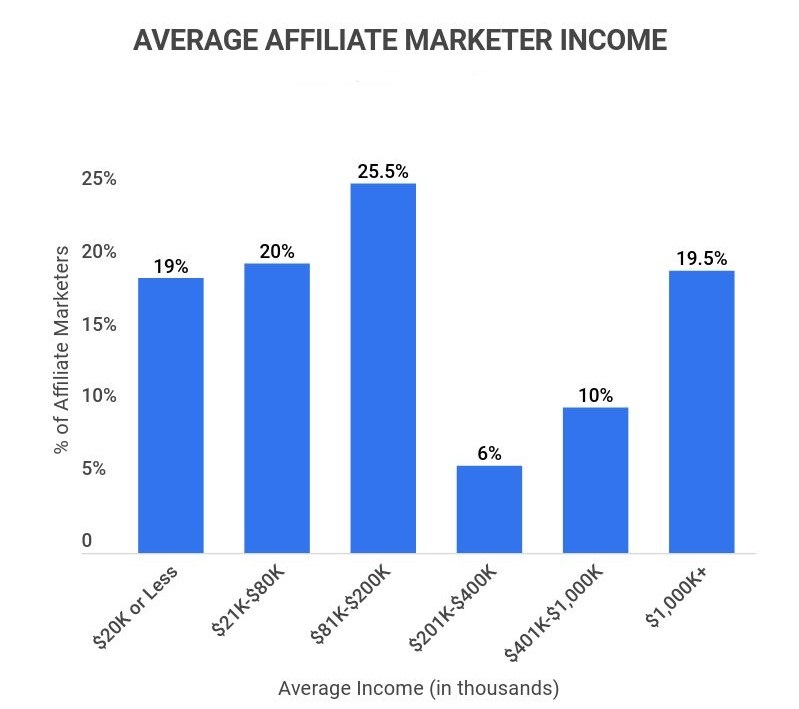What is Affiliate Marketing and How Does it Work?
Affiliate marketing is a form of online marketing that involves promoting products or services from another company and earning commissions on sales or referrals made through one’s own unique affiliate link. It is a popular way for individuals and businesses to monetize their online presence, and has become a key component of many digital marketing strategies.
The process of affiliate marketing typically involves four parties: the merchant (also known as the product creator), the affiliate marketer, the affiliate network, and the customer. The merchant creates a product or service they want to sell, while the affiliate marketer promotes the product to potential customers through various marketing channels, such as social media, blog posts, or video content.
The affiliate network acts as an intermediary between the merchant and the affiliate marketer, providing a platform for tracking referrals, managing commissions, and handling customer support. When a customer clicks on the affiliate marketer’s unique link and makes a purchase or completes a desired action, the affiliate marketer earns a commission.
Affiliate marketing has become a significant industry, with thousands of companies and individuals participating in affiliate programs. According to a report by the Affiliate Marketing Benchmark Report, the global affiliate marketing industry is projected to reach $12 billion by 2023, with the average income of an affiliate marketer ranging from a few hundred to several thousand dollars per month.
The benefits of affiliate marketing are numerous. For merchants, it provides a cost-effective way to reach new customers and increase sales. For affiliate marketers, it offers a flexible and potentially lucrative way to monetize their online presence. And for customers, it provides access to a wide range of products and services, often with exclusive discounts and promotions.
As the affiliate marketing industry continues to grow and evolve, it’s essential for those involved to stay up-to-date with the latest trends, strategies, and best practices. By understanding how affiliate marketing works and how to effectively promote products, individuals and businesses can unlock the full potential of this powerful marketing channel.
How to Get Started with Affiliate Marketing: A Step-by-Step Guide
Getting started with affiliate marketing can seem daunting, but with a clear understanding of the process, anyone can begin their journey to success. The first step is to choose a niche, which is a specific area of interest or expertise. This could be anything from fitness and health to finance and technology.
When selecting a niche, it’s essential to consider the level of competition, the potential for profitability, and the audience’s engagement. A niche with high demand and low competition is ideal for affiliate marketers. Research tools like Google Trends, Amazon Best Sellers, and social media can help identify trending niches and products.
Once a niche is chosen, the next step is to select affiliate programs that offer products or services in that niche. There are numerous affiliate programs available, including Amazon Associates, ShareASale, and Commission Junction. Each program has its own set of rules, commission rates, and cookie durations, so it’s crucial to research and compares the programs before joining.
After joining an affiliate program, the next step is to create a website or social media presence to promote products. A website provides a central hub for affiliate marketers to share content, product reviews, and affiliate links. Social media platforms like Instagram, Facebook, and Twitter can also be used to promote products and reach a wider audience.
When creating content, it’s essential to focus on providing value to the audience. This can be achieved by creating high-quality product reviews, tutorials, and guides. Affiliate marketers should also utilize search engine optimization (SEO) techniques to increase their website’s visibility and drive organic traffic.
In addition to creating content, affiliate marketers should also build an email list to promote products and increase earnings. Email marketing allows affiliate marketers to reach their audience directly and promote products that are relevant to their interests.
Finally, affiliate marketers should track their results and adjust their strategies accordingly. This can be done using analytics tools like Google Analytics, which provides insights into website traffic, conversion rates, and earnings.
By following these steps, anyone can get started with affiliate marketing and begin their journey to success. Remember, affiliate marketing is a performance-based marketing model, which means that earnings are directly tied to performance. With persistence, creativity, and continuous learning, affiliate marketers can unlock their earning potential and achieve success in the industry.
The Average Income of an Affiliate Marketer: What to Expect
The average income of an affiliate marketer can vary widely depending on several factors, including the niche, audience engagement, and marketing strategies. While some affiliate marketers earn a few hundred dollars per month, others can earn tens of thousands of dollars or more.
According to a survey by Affiliate Marketing Benchmark Report, the average income of an affiliate marketer is around $5,000 per month. However, this figure can range from as low as $100 per month to as high as $50,000 per month or more.
One of the main factors that influence earnings is the niche. Affiliate marketers who promote high-demand products in a competitive niche tend to earn more than those who promote low-demand products in a less competitive niche. For example, affiliate marketers who promote fitness and health products tend to earn more than those who promote niche products like gardening or cooking.
Audience engagement is another crucial factor that affects earnings. Affiliate marketers who have a highly engaged audience tend to earn more than those who have a less engaged audience. This is because a highly engaged audience is more likely to click on affiliate links and make purchases.
Marketing strategies also play a significant role in determining earnings. Affiliate marketers who use effective marketing strategies like email marketing, social media marketing, and content marketing tend to earn more than those who use less effective strategies.
Commission structures also impact earnings. Affiliate marketers who promote products with high commission rates tend to earn more than those who promote products with low commission rates. For example, affiliate marketers who promote products with a 50% commission rate tend to earn more than those who promote products with a 10% commission rate.
While the average income of an affiliate marketer can provide a rough estimate of what to expect, it’s essential to remember that earnings can vary widely depending on individual circumstances. With persistence, creativity, and continuous learning, affiliate marketers can increase their earnings and achieve success in the industry.
It’s also worth noting that affiliate marketing is a performance-based marketing model, which means that earnings are directly tied to performance. This means that affiliate marketers who are willing to put in the effort and optimize their marketing strategies can increase their earnings and achieve success in the industry.
Factors That Affect Affiliate Marketing Income: Understanding the Variables
Affiliate marketing income is influenced by several factors, including website traffic, conversion rates, and commission structures. Understanding these variables is crucial to optimizing earnings and achieving success in the industry.
Website traffic is a critical factor in affiliate marketing income. The more traffic an affiliate marketer can drive to their website or social media presence, the higher their potential earnings. However, traffic alone is not enough; affiliate marketers must also focus on converting visitors into customers.
Conversion rates are a key metric in affiliate marketing, as they measure the percentage of visitors who complete a desired action, such as making a purchase or filling out a form. Affiliate marketers can optimize their conversion rates by using effective marketing strategies, such as email marketing, social media marketing, and content marketing.
Commission structures also play a significant role in affiliate marketing income. Affiliate marketers who promote products with high commission rates tend to earn more than those who promote products with low commission rates. For example, affiliate marketers who promote products with a 50% commission rate tend to earn more than those who promote products with a 10% commission rate.
Another factor that affects affiliate marketing income is the niche or industry. Affiliate marketers who promote products in high-demand niches tend to earn more than those who promote products in low-demand niches. For example, affiliate marketers who promote fitness and health products tend to earn more than those who promote niche products like gardening or cooking.
Affiliate marketers can optimize their earnings by understanding these variables and adjusting their strategies accordingly. For example, affiliate marketers can increase their website traffic by using search engine optimization (SEO) techniques, such as keyword research and link building.
Additionally, affiliate marketers can optimize their conversion rates by using effective marketing strategies, such as email marketing and social media marketing. By understanding the factors that affect affiliate marketing income, affiliate marketers can take steps to optimize their earnings and achieve success in the industry.
It’s also worth noting that affiliate marketing is a performance-based marketing model, which means that earnings are directly tied to performance. This means that affiliate marketers who are willing to put in the effort and optimize their marketing strategies can increase their earnings and achieve success in the industry.
Success Stories: Real-Life Examples of Affiliate Marketers Who Have Made It Big
Affiliate marketing has created numerous success stories, with many affiliate marketers achieving significant earnings and building successful businesses. Here are a few inspiring examples of affiliate marketers who have made it big:
Pat Flynn, a well-known affiliate marketer, has built a successful business promoting products in the fitness and health niche. He has earned over $1 million in affiliate commissions and has become a leading authority in the affiliate marketing industry.
Michelle Schroeder-Gardner, a successful affiliate marketer, has earned over $100,000 per month promoting products in the personal finance niche. She has built a large following and has become a leading expert in the field of affiliate marketing.
These success stories demonstrate that affiliate marketing can be a lucrative and rewarding career. However, it’s essential to remember that success in affiliate marketing requires dedication, hard work, and a willingness to learn and adapt.
One of the key factors that contribute to the success of affiliate marketers is their ability to choose a profitable niche. A profitable niche is one that has a high demand for products and a relatively low level of competition. Affiliate marketers who choose a profitable niche are more likely to succeed and earn significant earnings.
Another factor that contributes to the success of affiliate marketers is their ability to create high-quality content. High-quality content is essential for attracting and engaging with an audience, and for promoting products effectively. Affiliate marketers who create high-quality content are more likely to succeed and earn significant earnings.
In addition to choosing a profitable niche and creating high-quality content, affiliate marketers must also be able to build a large and engaged audience. This can be achieved through a variety of marketing strategies, including social media marketing, email marketing, and content marketing.
By following the strategies and techniques used by successful affiliate marketers, anyone can build a successful affiliate marketing business and earn significant earnings. However, it’s essential to remember that success in affiliate marketing requires dedication, hard work, and a willingness to learn and adapt.
Common Mistakes to Avoid in Affiliate Marketing: Lessons from the Experts
Affiliate marketing can be a lucrative and rewarding career, but it’s not without its challenges. Many affiliate marketers make common mistakes that can hinder their success and reduce their earnings. In this section, we’ll explore some of the most common mistakes to avoid in affiliate marketing, and provide lessons from the experts on how to overcome them.
One of the most common mistakes in affiliate marketing is poor niche selection. Choosing a niche that is too competitive or has low demand can lead to low earnings and a lack of success. To avoid this mistake, it’s essential to conduct thorough research and choose a niche that has a high demand and relatively low competition.
Another common mistake is inadequate content creation. Affiliate marketers who fail to create high-quality content that resonates with their audience will struggle to build trust and generate sales. To avoid this mistake, it’s essential to create content that is informative, engaging, and relevant to your audience.
Ineffective marketing tactics are also a common mistake in affiliate marketing. Affiliate marketers who rely on outdated or ineffective marketing strategies will struggle to reach their target audience and generate sales. To avoid this mistake, it’s essential to stay up-to-date with the latest marketing trends and strategies, and to continually test and optimize your marketing efforts.
Not building an email list is another common mistake in affiliate marketing. An email list is a valuable asset that can help you build trust and generate sales with your audience. To avoid this mistake, it’s essential to create a lead magnet that resonates with your audience and to build an email list that you can use to promote products and services.
Not disclosing affiliate links is also a common mistake in affiliate marketing. The Federal Trade Commission (FTC) requires affiliate marketers to disclose their affiliation with the product or service they are promoting. To avoid this mistake, it’s essential to clearly disclose your affiliation with the product or service you are promoting, and to comply with the FTC guidelines.
By avoiding these common mistakes, affiliate marketers can increase their chances of success and maximize their earnings. Remember, affiliate marketing is a performance-based marketing model, and success requires persistence, creativity, and continuous learning.
Maximizing Your Earnings: Advanced Affiliate Marketing Strategies
Affiliate marketing is a performance-based marketing model that requires continuous learning and optimization to maximize earnings. In this section, we’ll explore advanced affiliate marketing strategies that can help you increase your earnings and achieve success in the industry.
Email marketing is a powerful tool for affiliate marketers, allowing you to build a list of subscribers and promote products to them. To maximize your earnings with email marketing, focus on building a high-quality list of subscribers who are interested in your niche. Use email marketing automation tools to personalize your emails and increase engagement.
Retargeting is another advanced affiliate marketing strategy that can help you increase your earnings. Retargeting involves serving ads to users who have previously visited your website or engaged with your content. This can help you reach users who are already interested in your products and increase conversions.
Influencer partnerships are also a powerful way to increase your earnings as an affiliate marketer. Partner with influencers in your niche who have a large following and can promote your products to their audience. Use influencer marketing platforms to find and partner with influencers who are relevant to your niche.
Content marketing is also an essential strategy for affiliate marketers. Create high-quality content that resonates with your audience and promotes your products. Use content marketing platforms to distribute your content and increase your reach.
Video marketing is another advanced affiliate marketing strategy that can help you increase your earnings. Create high-quality video content that promotes your products and resonates with your audience. Use video marketing platforms to distribute your content and increase your reach.
Podcast marketing is also a powerful way to increase your earnings as an affiliate marketer. Create a podcast that promotes your products and resonates with your audience. Use podcast marketing platforms to distribute your content and increase your reach.
By incorporating these advanced affiliate marketing strategies into your marketing efforts, you can increase your earnings and achieve success in the industry. Remember, affiliate marketing is a performance-based marketing model that requires continuous learning and optimization to maximize earnings.
Conclusion: Unlocking Your Earning Potential as an Affiliate Marketer
Affiliate marketing is a performance-based marketing model that offers a lucrative opportunity for individuals and businesses to earn commissions by promoting products or services. To achieve success in affiliate marketing, it’s essential to understand the concept of affiliate marketing, how it works, and its benefits.
By following the steps outlined in this guide, you can get started with affiliate marketing and begin your journey to success. Remember to choose a profitable niche, select affiliate programs that align with your niche, and create a website or social media presence to promote products.
It’s also crucial to understand the factors that influence earnings, such as niche, audience engagement, and marketing strategies. Analyze the factors that impact affiliate marketing income, including website traffic, conversion rates, and commission structures, and optimize these variables for maximum earnings.
Don’t be discouraged by common mistakes that affiliate marketers make, such as poor niche selection, inadequate content creation, and ineffective marketing tactics. Instead, learn from the experts and avoid these pitfalls to achieve success in affiliate marketing.
By incorporating advanced affiliate marketing strategies, such as email marketing, retargeting, and influencer partnerships, you can maximize your earnings and achieve success in the industry.
Remember, affiliate marketing is a performance-based marketing model that requires persistence, creativity, and continuous learning to achieve success. By following the tips and strategies outlined in this guide, you can unlock your earning potential as an affiliate marketer and achieve success in the industry.
In conclusion, affiliate marketing is a lucrative opportunity for individuals and businesses to earn commissions by promoting products or services. By understanding the concept of affiliate marketing, how it works, and its benefits, and by following the steps outlined in this guide, you can achieve success in affiliate marketing and unlock your earning potential.

:max_bytes(150000):strip_icc()/affiliate-marketing-6a9d278b2e91467494d7c9168e17bab5.jpg)






